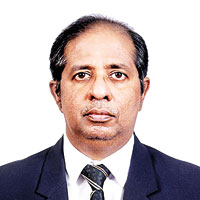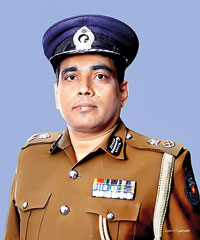News
Chief Epidemiologist spells out new quarantine rules
There have been changes in the period of quarantine imposed on different categories of people who are exposed to the new coronavirus.
“Any COVID-19 positive patient who is mildly symptomatic or asymptomatic (without symptoms) and is kept at an intermediate care centre does not need to undergo home quarantine after discharge,” said Chief Epidemiologist Dr. Sudath Samaraweera.

Dr.Sudath Samaraweera
He told the Sunday Times that this decision is based on medical evidence which indicates that in those who are mildly symptomatic or asymptomatic, it is unlikely for the virus to replicate after 10 days of the onset of symptoms and also to infect someone else.
If a positive person is symptomatic or has co-morbidities, then that person is admitted to hospital and treated. After discharge, such a person needs to undergo the 14-day home quarantine, it is learnt.
He said that all those being repatriated have to undergo a 14-day quarantine either in a state or hotel quarantine centre, while if it is a contact of a positive person or someone who has been exposed to COVID-19 in Sri Lanka, they can be in home quarantine or in a quarantine centre if their home situation is not conducive to such isolation for 14 days.
Dr. Samaraweera said that a further 14 days of quarantine are not required. Previously this was implemented because groups mixed together during quarantine and used common bathrooms/other facilities leading to a risk of infection spread during quarantine.
When asked, the Chief Epidemiologist said that a plausible explanation of how the second wave started is that it originated from the Ukranian flight crew quarantined in a hotel in Seeduwa.
The Deputy Director General (DDG), Public Health Services I, Dr. Hemantha Herath told a media briefing on Friday afternoon that not only schools but there are also discussions to open Daham Pasel.
He urged everyone to act responsibly, parents, those who transport schoolchildren, principals and teachers and also children. They should take all measures to stop the spread of the virus by adhering to the health guidelines.
To a query about opening up the country for tourism and also the contention of Public Health Inspectors (PHIs) that they were not informed about such arrivals, he said this was a pilot project as there was a need to help the industry to recover.
“We have taken the necessary precautions. The places tourists are visiting are open places and we are trying our best to keep them safe. We have to understand that they are coming to this country not to stay locked up for 14 days. This is why we are keeping them in a bio-bubble and have advised the public to stay away from the places they would be visiting,” said Dr. Herath.
He reiterated that the health guidelines have been issued to the Sri Lanka Tourism Development Authority (SLTDA) and also been shared with the Regional Directors of Health and the Medical Officers of Health (MOHs) and through them all PHIs are aware of them.
“Whether these guidelines are there or not, PHIs are empowered to ensure that basic health precautions are adhered to. We don’t expect these MOHs or PHIs to hang around or stay around these tourists to ensure that they keep to the guidelines. It is the responsibility of all the stakeholders, the tour operators, tour guides and all others who are accompanying these tourists to make sure these guidelines are followed. This is a national duty, as we are expecting the economy to run while keeping the public safe,” he added.
The Colombo Medical Faculty’s Senior Professor in Paediatrics, Prof. Pujitha Wickramasinghe said that when opening schools which is a dire need, health guidelines should be ensured by all.
“Staying home and following online classes without the interaction that children experience in schools has an impact on their mental and physical well-being,” he said.
Chief Epidemiologist Dr. Sudath Samaraweera also reiterated that it is everyone’s responsibility to prevent the spread of COVID-19. It is important for parents to keep a child at home if he/she is ill and seek medical treatment. Do not give a paracetamol tablet and send the child to school. If a child or staff member falls ill in school, particularly with symptoms similar to those of COVID-19, the authorities should keep that child/person away from others and send them to a doctor as soon as possible.
He explained that there is a tendency for infection to spread when people who wear masks remove them to eat and drink while sitting close to each other. Even schoolchildren must be told about this danger. There should also be adequate facilities to wash hands whenever needed and the washrooms in the school should always be clean.
“Discussions are on with regard to the reopening of montessories as well as tuition classes,” he said.
When asked, he added that Sri Lanka is at Alert Level 3 with clusters of infections. The origin of the exposure of a majority of positives can be traced. Even in the few cases that do not seem to be linked, when case histories are taken, they go back to the clusters. Such tracing takes time because of the large numbers.
| Virus is in the community – PHIs The public should be informed that the virus is in the community but we as Public Health Inspectors (PHIs) cannot give scientific confirmation on the spread as it is up to the Epidemiology Unit, urged the PHIs’ Union Secretary M. Balasooriya. Backing up his claim by stating that all over the country COVID-19 cases are being identified through random Rapid Antigen and RT-PCR testing, he reiterated that it has come to a point where it is hard to trace the contacts of some positive cases. This is why the public should be more cautious. “The testing is carried out by the Tri-Forces and Police, with some PHIs involved in the process. However, it is difficult for PHIs to get more involved in this because of the heavy workload they have,” said Mr. Balasooriya, pointing out that when RT-PCR testing finds that some people who have died at home are COVID-19 positive, their family members do not know how the deceased have got exposed to the virus. When asked about the country being opened to Ukranian tourists, he added that the PHIs are not involved in the project and they have not been informed about it either. | |
|
 Ajith Rohana Tests on those without face-masks People in the Western Province who are not wearing face masks are being subjected to RT-PCR or Rapid Antigen Testing from Tuesday, said Police Spokesman, Deputy Inspector General (DIG) Ajith Rohana, warning that they would also be dealt with under the Quarantine and Prevention of Diseases Ordinance which has a penalty of six months rigorous imprisonment and a fine of Rs. 10,000. Up to Thursday, 102 Rapid Antigen Tests and 273 RT-PCR Tests had been conducted of which 16 antigen tests turned out to be positive. The RT-PCR Test results are awaited, it is learnt. When asked whether such testing is a waste of resources, he argued that it was not, as they were able to identify positive people. Currently, they are providing masks to the public whenever they find people without them, but are looking for a permanent remedy. They are having discussions with a few organizations which are willing to donate masks. |

